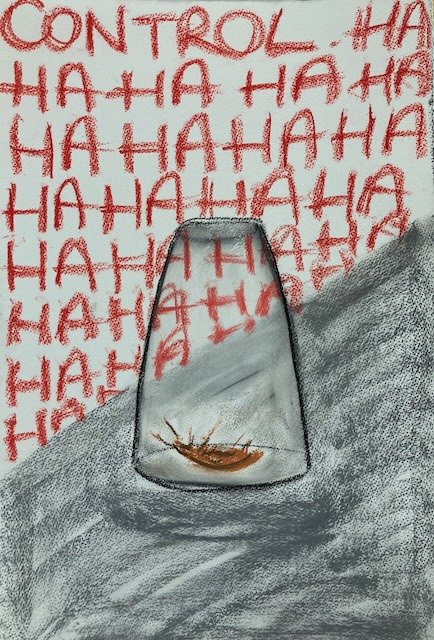
STUDIO BIZIO BY JOANNA BLACK
do you feel in control?
Artists frequently navigate the fine line between creative freedom and societal constraint. They may challenge prevailing ideologies, question authority, and provoke thought among audiences. This act of challenging the status quo can position art as a tool for social change, encouraging dialogue around issues like civil rights, identity, and the human experience. By presenting alternative narratives, artists can empower viewers to reconsider their values and beliefs.
control ©joanna black 2024
The correlation between control and mental health issues is a complex and multifaceted topic. Control can manifest in various forms, such as a desire for personal autonomy, the ability to influence one's environment, and the management of emotional responses. When individuals feel a lack of control in their lives, it can lead to feelings of helplessness, anxiety, and depression.
Research suggests that a perceived loss of control, whether in personal circumstances, relationships, or broader societal contexts, can contribute to the development or exacerbation of mental health issues. For instance, individuals who experience trauma or significant life changes may struggle with a diminished sense of agency, which can lead to increased stress levels and anxiety.
Conversely, the pursuit of excessive control can also have detrimental effects on mental health. Perfectionism and the need to control every aspect of life can result in chronic stress, burnout, and feelings of inadequacy. Those who face rigid standards often experience heightened anxiety and may find themselves in a cycle of self-criticism.
The relationship between the arts and control is just as complex, encompassing themes of expression, censorship, and the power dynamics inherent in the creation and dissemination of art. Throughout history, art has served as a reflection of societal norms and political climates, often acting as a form of commentary on the structures that govern us.
Artists frequently navigate the fine line between creative freedom and societal constraint. They may challenge prevailing ideologies, question authority, and provoke thought among audiences. This act of challenging the status quo can position art as a tool for social change, encouraging dialogue around issues like civil rights, identity, and the human experience. By presenting alternative narratives, artists can empower viewers to reconsider their values and beliefs.
However, the control exerted over the arts can stifle creativity and limit the spectrum of voices represented in the cultural dialogue. In some cases, this leads to self-censorship, where artists, (substitute this also for employees, husbands, wives, children if applicable) second-guess to avoid backlash or repercussions.
control underscores a critical dialogue about freedom, representation, and responsibilities. The tension between expression and restraint will continue to shape how people think and operate, influencing how stories are told and which perspectives receive visibility.
Humanity as a whole wrestles with control in the context of social norms, technological advancements, and ethical considerations. The rise of surveillance, data privacy concerns, and the influence of social media reflect a struggle for balance between security and freedom. As societal values evolve, so too does the discourse surrounding the limits and implications of control on a collective scale.
In summary, control is a complex concept that permeates various facets of existence, shaping interactions within companies, between employees and employers, among nations, through religious practices, and in the broader context of human society. Achieving harmony between control and freedom remains a persistent challenge across all spheres of influence.
Do you feel in control?
If would like to get in touch, please do. signing off, joanna black :)

